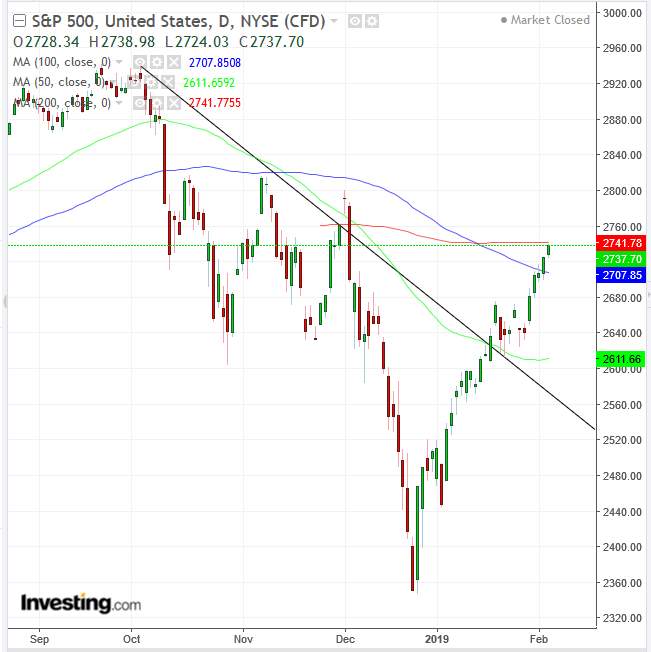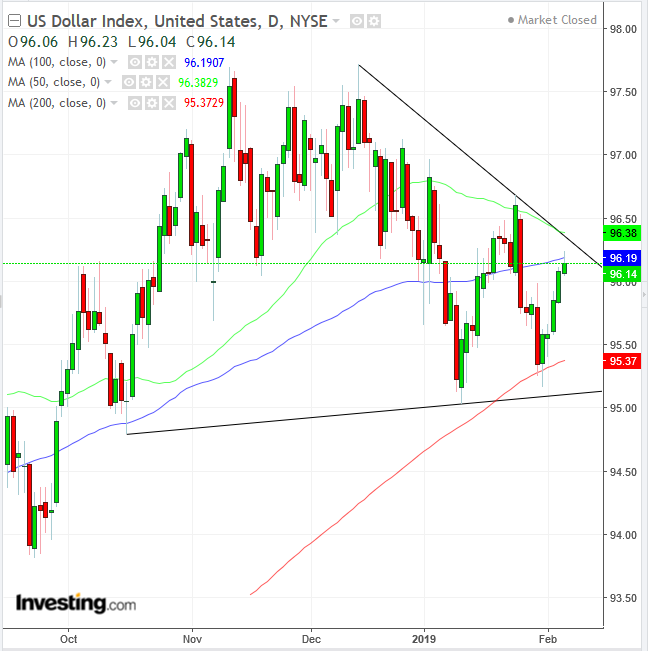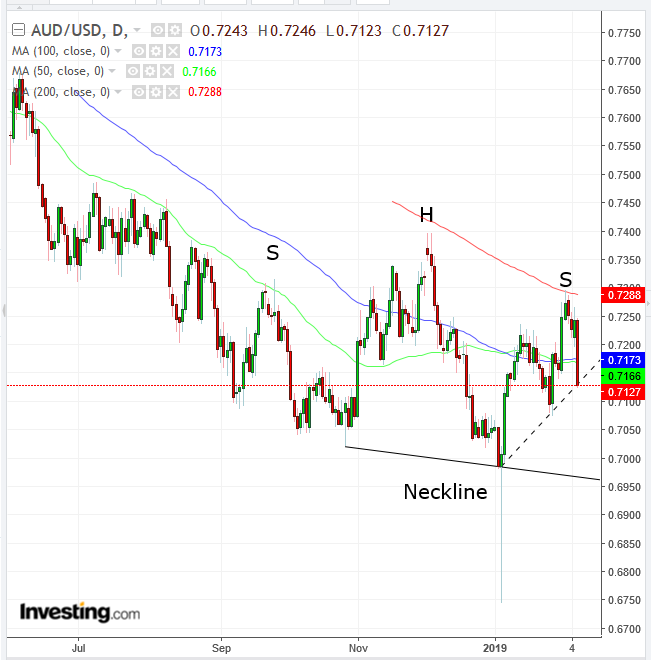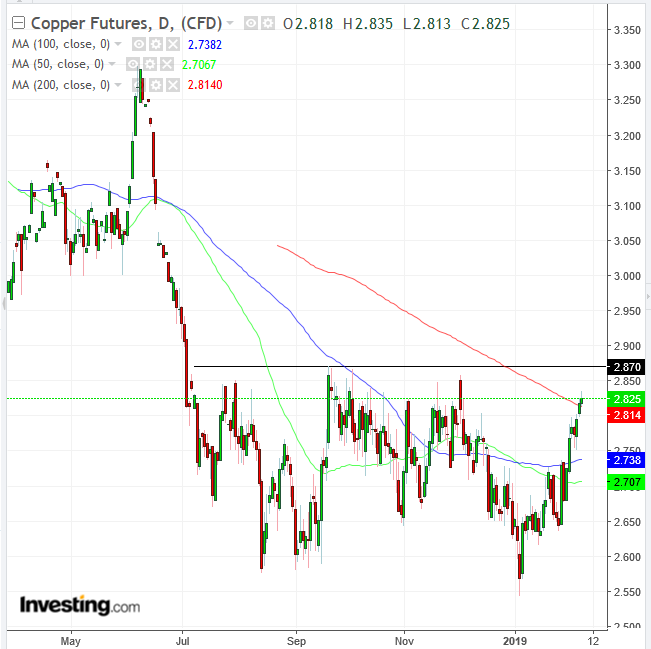- European recession fears weigh on EU stocks, U.S. futures
- Treasury yields drop; USD keeps climbing
- AUD sells off on RBA shift to neutral policy
- Brazilian glitch sends iron ore towards $90 level
Key Events
European shares slid lower alongside futures on the S&P 500, Dow and NASDAQ 100 this morning, spoiling chances for a six-day rally after markedly downbeat German factory orders reinforced the outlook of a European slowdown and mixed earnings results failed to reassure investors that momentum is not abating.
U.S. President Donald Trump’s State of the Union address on Tuesday, lacking signals of any progress on trade talks with China, also fell short of shoring up market sentiment.
The STOXX Europe 600 opened lower, unable to overcome a resistance line since mid October. BNP Paribas (PA:BNPP) dragged bank stocks lower after the French lender cut its 2020 target—though still beating full-year profits estimates—adding to the weight of broader corporate soft guidance which has been clouding the market since the end of last year. The pan-European benchmark later managed to crawl above neutral levels.
The earlier Asian session once again saw thin trading amid Lunar New Year holidays. However, Trump's comment on a two-day summit with North Korea leader Kim Jong Un at the end of the month boosted Japan’s Nikkei by 0.14 percent, even amid a yen rally. A stronger currency typically weighs on stocks, making a country's exports less competitive in a global market that is already hyper sensitive to trade jitters.
Global Financial Affairs
In Tuesday's U.S. session, equities climbed for the fifth straight day, as gains in the technology sector outweighed a retreat in financial shares, triggered by falling Treasury yields. Trading volumes, though, remained low.

The S&P 500 edged 0.47 percent higher, with nine out of eleven sectors closing in the green. Communication Services (+1.1 percent) provided the best returns, while Financials (-0.27 percent) slipped lower.
Earnings and economic data were mixed, giving investors little to trade on ahead of Trump’s address to the nation. Trading volumes were 15 percent below the 30-day average, raising questions as to how representative of the broader market recent price moves are. Meanwhile, the SPX tested the 200 DMA, only to retreat.
The Dow Jones Industrial Average climbed 0.68 percent, extending an upside breakout of its 100 and 200 DMAs for a third day.
The NASDAQ Composite snapped a 0.74 percent gain, outperforming its peers. The tech-heavy index extended a climb above its 100 DMA for a second day, but remained below its 200 DMA. Marquee tech stocks have been advancing nicely since the beginning of the year, but some software shares are the hiddent gems of the sector.
The Russell 2000 gained 0.22 percent, crawling above the 100 DMA, while the 200 DMA remains almost 4.5 percent away.
Overall, global equities are nearing levels not seen since November, in part spurred by the Federal Reserve’s tilt toward a neutral policy stance. Further clues on what 2019 holds for the stock market may come on Wednesday from Fed Chairman Jerome Powell’s first public comments following the January meeting and interest rate decision.
Also looming in the background are next week's talks in Beijing between U.S. Trade Representative Robert Lighthizer, Treasury Secretary Steven Mnuchin and Chinese counterparts.

The yield on 10-year Treasurys dropped for a second day, in line with upbeat risk assets, which helped the dollar extended the rally to a fifth day—though the USD found resistance by the 100 DMA and a downtrend line since December 13, giving up some gains.

The Australian dollar tumbled after Reserve Bank of Australia's chair Philip Lowe signaled a shift to a neutral stance on policy. Technically, the Aussie found support by an uptrend line since the beginning of the year, as it seems to be forming an H&S Continuation pattern, bearish in a downtrend.
In commodities news, Iron ore rallied toward $90 a metric ton after Brazilian multinational mining company Vale (NYSE:VALE) declared force majeure on a number of futures contracts after being ordered to suspend operations in one of its key mines in Minas Gerais state—thereby raising the prospect of a supply deficit this year.

Copper climbed to its highest level year-to-date, crossing over the 200 DMA and approaching levels that would signal a bottom.
WTI crude continued to slip below $54 a barrel on rising U.S. crude inventories. Technically, the price fell back below the neckline of an H&S bottom. Meanwhile, reported efforts by Saudi Arabia to lure Russia into a formal joint cartel group to control oil exports and prices may be set for failure.
Up Ahead
- Markets are closed in China, Hong Kong, Korea, Malaysia, Singapore, Taiwan and New Zealand.
- Central banks in India and the U.K. set rates on Thursday.
Earnings
- MetLife (NYSE:MET) is expected to report earnings after market close today, with a $1.3 EPS, up from $1.1 EPS the same quarter last year.
- Twitter (NYSE:TWTR) is due to report Thursday before market open, with a $0.16 EPS, up from the $0.1 posted for the corresponding quarter last year. Analysts expect the social media company's ongoing efforts to step up content quality will result in upbeat data.
- Philip Morris (NYSE:PM) will publish corporate results Thursday before market open. EPS is expected to be $1.17, down from 1.27 for the same quarter last year, on $7.39 billion revenues, down from $8.29 billion revenue last year.
- Hasbro (NASDAQ:HAS) is expected to publish its earnings report Friday before market open. Analysts expect an EPS of $1.68, down from last February’s $2.3, and revenues of $1.52 billion, down from $1.716 million for the same quarter last year.
Market Moves
Stocks
- The MSCI All-Country World Index fell 0.1 percent.
- The U.K.’s FTSE 100 edged 0.3 percent lower.
- The MSCI Emerging Market Index gained 0.1 percent to
Currencies
- The Dollar Index climbed 0.05 percent, paring a 0.16 percent advance when it reached the highest in almost two weeks on its fifth straight advance.
- The euro fell 0.2 percent to $1.1385, the weakest in almost two weeks.
- The British pound declined 0.1 percent to $1.2933.
- The Japanese yen advanced 0.3 percent to 109.67 per dollar.
Bonds
- The yield on 10-year Treasuries dropped two basis points to 2.68 percent.
- Germany’s 10-year yield fell one basis point to 0.16 percent.
- Britain’s 10-year yield slid two basis points to 1.209 percent.
- Japan’s 10-year yield declined less than one basis point to -0.013 percent.
Commodities
- West Texas Intermediate crude fell 0.3 percent to $53.49 a barrel, the lowest in more than a week.
- Gold declined less than 0.05 percent to $1,314.85 an ounce.
